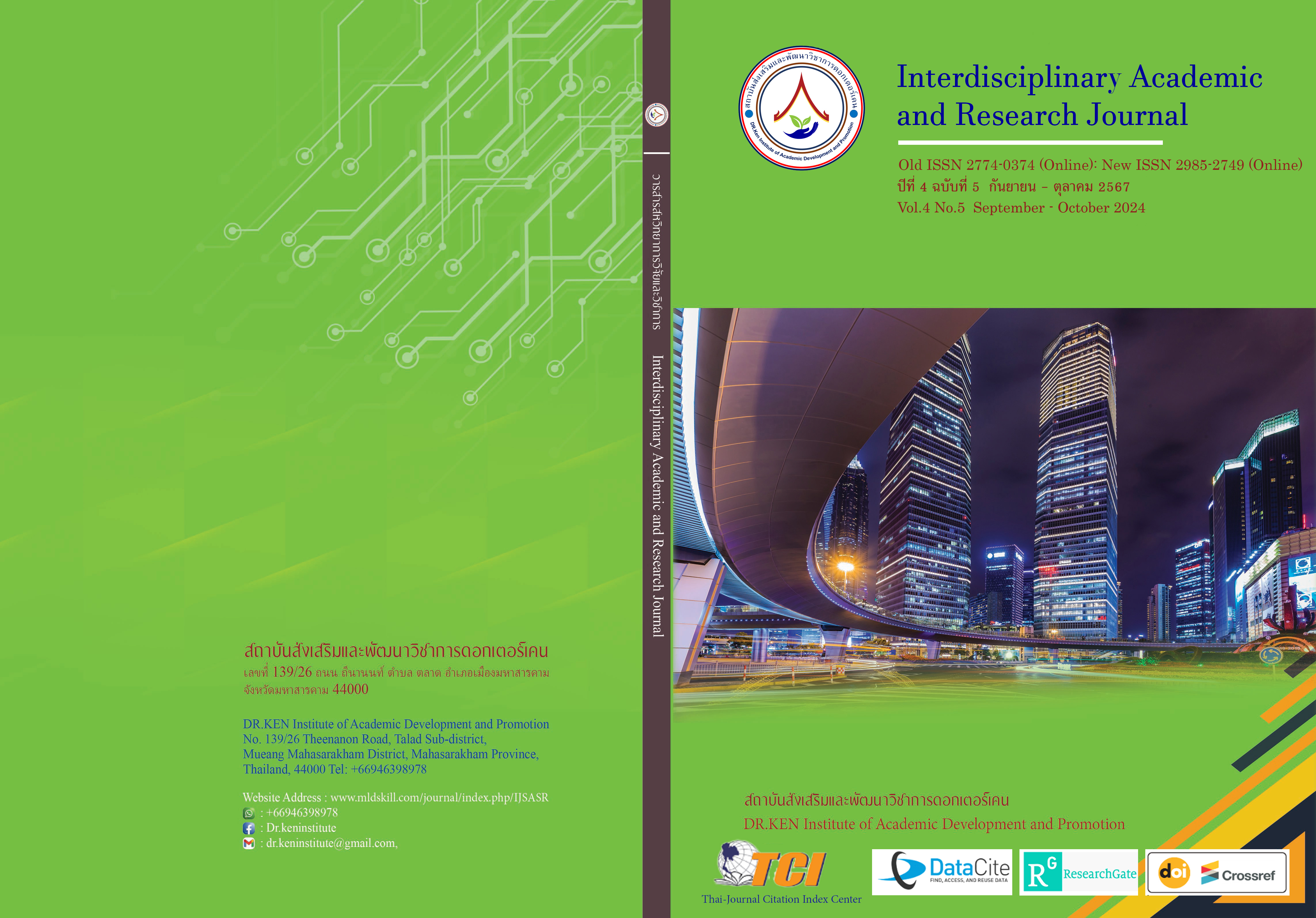Academic Administration that Affects Proactive Learning of Educational Institutions under Chaiyaphum Municipality
DOI:
https://doi.org/10.60027/iarj.2024.276090Keywords:
Academic administration; , Proactive learning managementAbstract
Background and Aims: This research aims to study and compare the level of academic administration that affects active learning management in educational institutions under Chaiyaphum Municipality. The analysis will be separated according to educational level. Work experience and type of educational institution. In addition, there is a study of academic administration guidelines that can affect the management of active learning in these educational institutions.
Methodology: The sample used in the research consisted of 129 personnel in educational institutions under Chaiyaphum Municipality, which were obtained from stratified random sampling. The research tools included a questionnaire using a 5-level rating scale and a structured interview with an IOC between 0.80 - 1.00 and a confidence value of 0.83. For the statistics used in data analysis, such as frequency, percentage, mean, and standard deviation. T-test, F-test, and pairwise difference test using the Scheffé Method.
Results: the finding found that (1) Academic administration that affects the management of active learning in educational institutions under Chaiyaphum Municipality, overall it is at a high level. When considering each aspect, it was found that academic administration that affects proactive learning management is at a high level in every aspect. (2) Results of the comparative analysis of opinions regarding academic administration that affect active learning management of educational institutions under Chaiyaphum Municipality. Classified by educational level work experience and type of educational institution found that there was no difference. (3) Guidelines for academic administration that affect active learning management in educational institutions under Chaiyaphum Municipality include improving or changing the curriculum to be consistent with active learning management. educational institution context and student context. Encouraging teachers to organize problem-based teaching and learning activities. integrated teaching. Encouraging teachers to measure and evaluate learning according to actual conditions, which meets the aims of education. and use the evaluation results to develop individual learners. Teachers are also encouraged to develop modern teaching materials. By using technology to organize teaching and learning. and use the results of supervision to further improve and develop teaching media.
Conclusion: The findings show that academic administration has a significant impact on active learning management in educational institutions in Chaiyaphum Municipality, with consistently high performance across all aspects. There were no differences according to educational level, work experience, or type of institution. Aligning curricula with active learning, encouraging problem-based and integrated teaching, promoting authentic assessment, and facilitating the development of modern teaching materials through technology and supervision are all important guidelines for improving academic administration.
References
คณน สิริโชคเจริญ. (2565). การพัฒนาแนวทางการบริหารงานวิชาการโดยใช้วงจรคุณภาพสำหรับสถานศึกษาสังกัดเทศบาล ตำบลในจังหวัดมหาสารคาม. การศึกษามหาบัณฑิต สาขาวิชาการบริหารและพัฒนาการศึกษา มหาวิทยาลัยมหาสารคาม.
ชยพล ดีอุ่น. (2565). การบริหารจัดการเรียนรู้ตามแนวทาง Active Learning ของสถานศึกษาศูนย์เครือข่ายพัฒนาคุณภาพการศึกษาลุ่มน้ำลาง อำเภอปางมะผ้า สังกัดสำนักงานเขตพื้นที่การศึกษาประถมศึกษาแม่ฮ่องสอน เขต 1. Journal of Modern Learning Development, 7 (4), 10-23.
เชษฐชาย วรรณประพันธ์. (2564). รูปแบบการบริหารสถานศึกษาในการส่งเสริมการจัดการเรียนรู้เชิงรุก (Active Learning) เพื่อยกระดับคุณภาพการศึกษาสถานศึกษาลำพระเพลิงพิทยาคม. สำนักงานเว็บไซต์ครูบ้านนอกดอทคอม
เทศบาลเมืองชัยภูมิ. (2566). แผนปฏิบัติการเทศบาลเมืองชัยภูมิ. ชัยภูมิ : เทศบาลเมืองชัยภูมิ.
นคร จงอนุรักษ์. (2564). การบริหารงานวิชาการของโรงเรียนชะอำคุณหญิงเนื่องบุรี.ศึกษาศาสตรมหาบัณฑิต สาขาวิชาการบริหารการศึกษา มหาวิทยาลัยศิลปากร.
บุญชม ศรีสะอาด. (2553). การวิจัยเบื้องต้น. พิมพ์ครั้งที่ 8. กรุงเทพฯ : สุวีริยาสาส์น.
เบญจวรรณ กสิผล. (2565). การบริหารงานวิชาการของผู้อำนวยการโรงเรียนขยายโอกาสทางการศึกษาอำเภอวิเศษชัยชาญ จังหวัดอ่างทอง. ศึกษาศาสตรมหาบัณฑิต สาขาวิชาการบริหารการศึกษามหาวิทยาลัยเกริก.
ปัญญา ตรีเลิศพจน์กุล. (2566). “การศึกษาสภาพการบริหารงานวิชาการในสถานศึกษาขยาย โอกาสทางการศึกษา สังกัดสำนักงานเขตพื้นที่การศึกษาประถมศึกษาอุบลราชธานีเขต 5”. วารสารการบริหารการปกครองและนวัตกรรมท้องถิ่น, 7(1), 179 – 192.
สายใจ สูนกามรัตน์. (2564). “การบริหารงานวิชาการกับประสิทธิผลการสอนของครูในสถานศึกษา สังกัดสำนักงานเขตพื้นที่การศึกษาประถมศึกษากระบี่”. วารสาร มจร อุบลปริทรรศน์, 6(3), 365 – 378.
สำนักงานเขตพื้นที่การศึกษามัธยมศึกษาลำปาง ลำพูน. (2565). แนวทางการจัดการเรียนรู้เชิงรุก. ลำปาง : สำนักงานเขตพื้นที่การศึกษามัธยมศึกษาลำปาง ลำพูน.
สุรางค์ ประไพนพ. (2566). “รูปแบบการบริหารชุมชนแห่งการเรียนรู้ทางวิชาชีพยุคดิจิทัลเพื่อพัฒนาการจัดการเรียนรู้เชิงรุก โรงเรียนบุญคุ้มราษฎร์บำรุง สำนักงานเขตพื้นที่การศึกษาประถมศึกษาปทุมธานี เขต 1”. วารสารมหาจุฬานาครทรรศน์, 10(1), 46 -58.
Krejcie, R.V., & Morgan, D.W. (1970) Determining Sample Size for Research Activities. Educational and Psychological Measurement, 30, 607-610.
Downloads
Published
How to Cite
Issue
Section
License
Copyright (c) 2024 Interdisciplinary Academic and Research Journal

This work is licensed under a Creative Commons Attribution-NonCommercial-NoDerivatives 4.0 International License.
Copyright on any article in the Interdisciplinary Academic and Research Journal is retained by the author(s) under the under the Creative Commons Attribution-NonCommercial-NoDerivatives 4.0 International License. Permission to use text, content, images, etc. of publication. Any user to read, download, copy, distribute, print, search, or link to the full texts of articles, crawl them for indexing, pass them as data to software, or use them for any other lawful purpose. But do not use it for commercial use or with the intent to benefit any business.
















.png)


